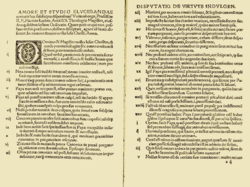| Part of a series on |
| Protestantism |
|---|
 |
| Concepts |
| History |
| Branches |
| Movements |
|
|
Protestant Reformers were theologians whose careers, works and actions brought about the Protestant Reformation of the 16th century.
In the context of the Reformation, Martin Luther was the first reformer, sharing his views publicly in 1517, followed by Andreas Karlstadt and Philip Melanchthon at Wittenberg, who promptly joined the new movement. In 1519, Huldrych Zwingli became the first reformer to express a form of the Reformed tradition.
Listed are the most influential reformers only. They are listed by movement, although some reformers influenced multiple movements and are included in each respective section.
Notable precursors
Main article: Proto-ProtestantismThroughout the Middle Ages, according to Edmund Hamer Broadbent, there were a number of Christian movements that sought a return to what they perceived as the purity of the Apostolic church and whose teachings foreshadowed Protestant ideas.
- Claudius of Turin
- Gottschalk of Orbais
- Berengar of Tours
- Peter Waldo
- Lorenzo Valla
- Wessel Gansfort
- Girolamo Savonarola
- Jacques Lefèvre d'Étaples
- John Wycliffe
- Jan Hus
Magisterial Reformers

There were a number of key reformers within the Magisterial Reformation, including:
Lutheran
- Martin Luther
- Philipp Melanchthon
- Justus Jonas
- Martin Chemnitz
- Georg Spalatin
- Joachim Westphal
- Andreas Osiander
- Johannes Brenz
- Johannes Bugenhagen
- Andreas Karlstadt, later a Radical Reformer
- Hans Tausen
- Mikael Agricola
- Primož Trubar
- Jiří Třanovský
Reformed
- Huldrych Zwingli
- Martin Bucer
- John Calvin
- Heinrich Bullinger
- Theodore Beza
- William Farel
- John Knox
- Wolfgang Capito
- Johannes Oecolampadius
- Peter Martyr Vermigli
- Leo Jud
Anglican
Arminian
Radical Reformers
Important reformers of the Radical Reformation included:
Anabaptist
Schwenkfelder
Unitarian
Second Front Reformers
There were also a number of people who initially cooperated with the Radical Reformers, but separated from them to form a "Second Front", principally in objection to sacralism. Among these were:
Anabaptist
Counter-Reformers
Catholics who actively opposed the Reformation and partook in the Counter-Reformation include:
- Girolamo Aleandro
- Augustine Alveld
- Thomas Cajetan
- Johann Cochlaeus
- Johann Eck
- Jerome Emser
- Pope Leo X
- John Tetzel
- Thomas More
- Ignatius of Loyola
- Francis de Sales
- Pope Paul III
- Pope Pius V
- Charles Borromeo
- Francis Xavier
- Peter Faber
- Diego Laynez
See also
- List of Protestant Reformers (alphabetical)
- Protestantism in Germany
References
- Broadbent, E.H. (1931). The Pilgrim Church. Basingstoke: Pickering & Inglis. ISBN 0720806771.
- F. L. Cross; E. A. Livingstone, eds. (13 March 1997). The Oxford Dictionary of the Christian Church, 3rd edition. USA: Oxford University Press. pp. 359. ISBN 0-19-211655-X.
- "Gottschalk Of Orbais | Roman Catholic theologian". Britannica.com. Retrieved 2021-10-27.
- caryslmbrown (2017-07-18). "Reformation parallels: the case of Gottschalk of Orbais". Doing History in Public. Retrieved 2021-10-27.
- Lockridge, Kenneth R. "Gottschalk "Fulgentius" of Orbais".
- Minton, Gretchen E. (2014-01-26). John Bale's 'The Image of Both Churches'. Springer Science & Business Media. ISBN 978-94-007-7296-0.
Berengar of Tours was an 11th-century theologian who argued that the doctrine of transubstantiation was contrary to reason and unsupported by scripture
- Siebeck, Mohr (11 March 2016). Prophecy, Piety, and the Problem of Historicity: Interpreting the Hebrew. Germany. p. 372. ISBN 978-3-16-154270-1.
Berengar of Tours (c. 1005-1088), Bernand of Clairvaux, the Waldensians in the twelfth century, the Albigensians in the thirteenth century and John Wycliffe (x. 1330-1385) and Jan Hus (c. 1370-1415) in the fourteenth and fifteenth centuries, are all prefigured in the poetic images of Solomon's Songs. They all become forerunners of Luther and Calvin
{{cite book}}: CS1 maint: location missing publisher (link) - Jung, Emma; Franz, Marie-Luise von (1998). The Grail Legend. Princeton University Press. ISBN 978-0-691-00237-8.
Berengar of Tours (first half og the eleventh century), whose views occasioned the dispute known as the Second Eucharistic Controversy. Berengar aught that the body and the blood of the Lord were no "real" in the Eucharist but a specific image or likeleness ("figuram quandam similitudinem"). He was thus a forerunner of the Reformers.
- "Pierre Valdo (1140-1217) and the Waldenses". Musée protestant. Retrieved 2021-12-31.
- "Philip Schaff: History of the Christian Church, Volume VI: The Middle Ages. A.D. 1294-1517 - Christian Classics Ethereal Library". www.ccel.org. Retrieved 2021-12-23.
- "The forms of communication employed by the Protestant Reformers and especially Luther and Calvin" (PDF). Pharos Journal of Theology. 98. 2016.
John of Wessel was one member in the group who attacked indulgences (Reddy 2004:115). The doctrine of justification by faith alone was the teaching of John of Wessel (Kuiper 1982:151). He rejected the doctrine of transubstantiation where it is believed when the priest pronounces the sacraments then the wine and bread in turned into the real body and blood of Christ
- Chisholm, Hugh, ed. (1911). "Savonarola, Girolamo" . Encyclopædia Britannica (11th ed.). Cambridge University Press.
- "Philip Schaff: History of the Christian Church, Volume VI: The Middle Ages. A.D. 1294-1517 - Christian Classics Ethereal Library". www.ccel.org. Retrieved 2021-12-23.
- "Lollard | English religious history". Britannica.com. Retrieved 2021-10-27.
- "Jan Hus (1369-1415) and the Hussite wars (1419-1436)". museéprotestant. Archived from the original on Jun 18, 2023.
Further reading
- George, Timothy. Theology of the Reformers. Nashville, Tenn.: Broadman Press, 1988. ISBN 978-0805401950. N.B.: Comparative studies of the various leaders of the Magisterial and Radical movements of the 16th century Protestant Reformation.
